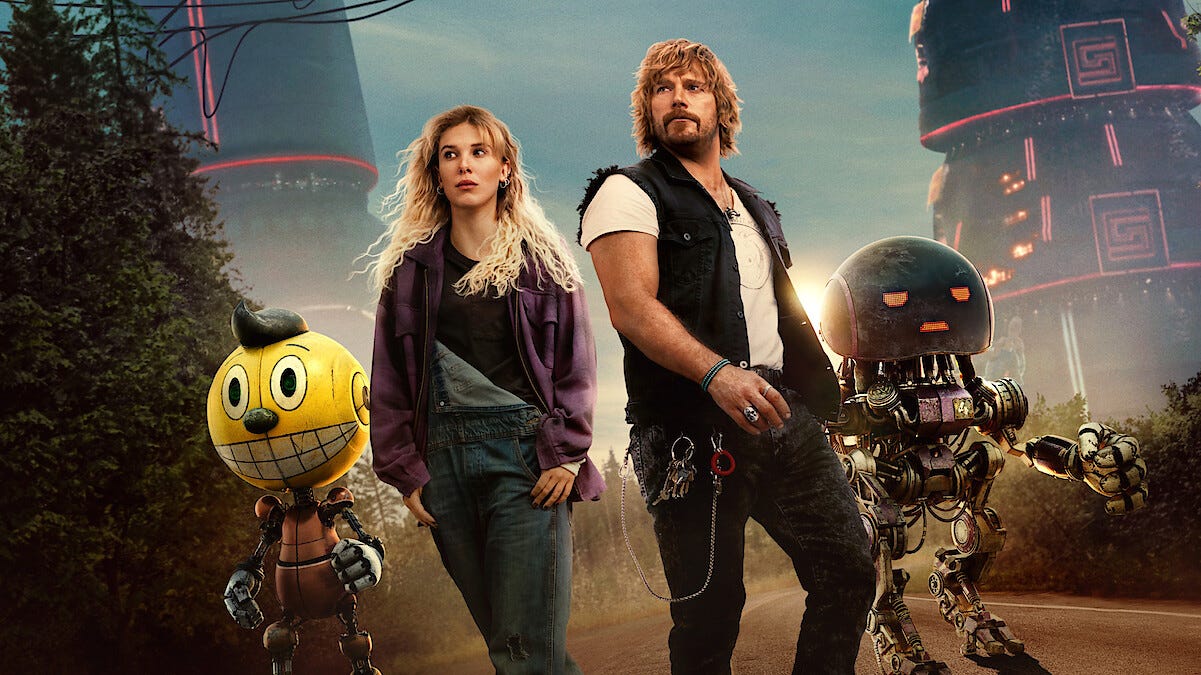The Not-So-Electric State
The Russo Brothers' post-Marvel output is 0-3.
Between 2014 and 2019, Anthony and Joe Russo directed four of the best, highest-grossing movies in the Marvel Cinematic Universe: Captain America: The Winter Soldier, Captain America: Civil War, Avengers: Infinity War, and Avengers: Endgame. But, creatively speaking at least, they’ve been in a rut ever since. First, there was Cherry, their ill-begotten adaptation of a book by Nico Walker. Then, there was The Grey Man, their ill-begotten adaptation of a book by Mark Greaney. Now comes The Electric State, their ill-begotten adaptation of a book by Simon Stålenhag. What a hat trick!
The Electric State takes place in an alternate reality where highly advanced robots became staples of society in the 1950s, and were predominantly tasked with menial jobs. In the ‘90s, though, the robots - as sci-fi robots are wont to do - decided they wanted independence, and thus launched an uprising against humanity, led by a Mr. Peanut robot voiced by Woody Harrelson (no, I am not joking). They were eventually defeated thanks to revolutionary technology by a company called Sentre (pronounced “Center”), which allows people to put on massive VR headsets with which they can visit virtual worlds and, more importantly in terms of warfare, control humanoid military drones. The result of the robot’s surrender is that they were exiled to a 200,000 square-mile patch of land in the Southwest. At the same time, Sentre’s VR headsets became commonplace, making the company’s Elon Musk-esque CEO, Ethan Skate (Stanley Tucci), incredibly rich.
Somewhere in the midst of this, a young woman named Michelle (Millie Bobby Brown) and her family were in a car accident, of which she was the lone survivor… or so she thought! One day, years after the war, she comes to believe that her prodigy-level-genius younger brother, Christopher (Woody Norman), is alive after all, and being held by Sentre for unknown, presumably nefarious purposes. She thus sets out on an adventure to find and free Christopher, eventually enlisting the aid of a Han Soloish smuggler, Keats (Chris Pratt), and his smart-aleck robot companion, Herman (Anthony Mackie, although his voice has been altered so much you may not even realize it’s him). Meanwhile, Skate employs a robot-hating mercenary, Bradbury (Giancarlo Esposito), to ensure that Michelle and her allies fail their mission.
Working from a screenplay by Christopher Markus & Stephen McFeely - the same fellas who wrote all their Marvel movies, as well as The Grey Man - the Russos clearly have aspirations of making The Electric State a Spielbergian family adventure. And for about a half hour or so, at least, they mostly succeed - at least so long we define “Spielbergian” as being more Ready Player One, less E.T.. The build-up to the meat of the narrative is by no means brilliant, but it is solid: we understand the characters and their goals, we understand the conflict, and we’re invested in what’s going to happen. Everything is off to a promising start.
But the movie loses steam almost as soon as Michelle meets Keats at the end of the first act. If you’ve ever been nerdy enough to listen to the audio commentaries the Russos recorded with Markus and McFeely for their MCU oeuvre (their MCoeuvre?), you know that they have a dependable, textbook-ready formula for how they concoct their stories, and that formula was certainly used here; the problem is that while the beats are all in the right place, none of them are very interesting. If you think of the story as a connect-the-dots, the dots are all precisely where they should be; it’s the connective lines that are the problem.
That’s because there’s an abundance of talking about what has to occur next, but very little actually happening. Michelle and Keats reach the natural conclusions of their respective arcs, but it’s not entirely clear how they arrived there. Honestly, I don’t think those arcs are even very well set up. Without giving anything away, when you realize the endpoint of Michelle’s story, it’s not like, “Ohhhh, so THAT’S where this was going this whole time!” so much as it’s like, “Ohhhh, so THAT’S where this was going this whole time???”
Two other things that aren’t doing the movie any favors: the supporting characters and the action scenes.
The secondary robots are all voiced by famous actors (Harrelson, Brian Cox, Jenny Slate, etc.), but the Russos and their writers seem to hope our pre-existing attachment to these performers will make us care about the fates of their characters, and it doesn’t work out that way. There’s a big battle at the end, kinda like the one at the conclusion of Endgame, but it doesn’t have any of the weight of the one in Endgame because they haven’t done a good enough job getting us invested in the fates of these various bots (granted, Endgame had the benefit of a decades’ worth of set-up… but still… Seven Samurai this ain’t).
As for those set pieces, well… they not only lack inventiveness, but they’re poorly paced. Netflix has an option to watch something at 1.5x its normal speed; maybe doing so would help here? ‘Cause as they’re presented, these sequences all feel surprisingly low-energy. And it’s not like the Russos can’t do action (did I mention they spent six years making Marvel movies?). Somehow, they just biffed it here.
It was announced last year that the Russos, along with McFeely (but not, tellingly, Markus), are returning to Marvel to make the upcoming Avengers: Doomsday and Avengers: Secret Wars. Post-Electric State, I can see why they’d be anxious to get back to the MCU. The Electric State isn’t as bad as the vicious critical reception would have you believe, but it’s the action-adventure movie version of elevator music: in the background, not entirely unpleasant, and utterly forgettable.



